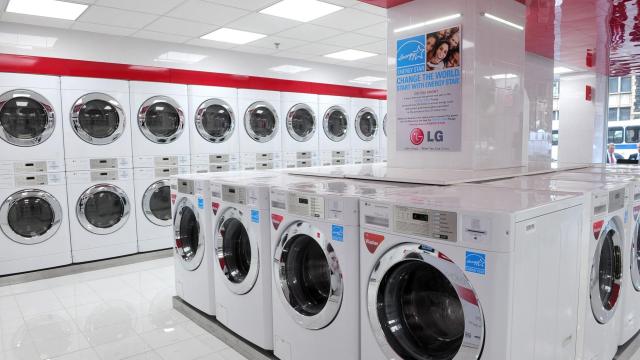Tremble, ye mighty, and despair in the face of our new overlords: efficient dishwashers. The Biden administration is carrying out what is, arguably, former president Trump’s worst fear, and preparing to mandate once again that dishwashers and washers and dryers do their jobs more efficiently. (Typical politician, that Joe Biden, in the pocket of Big Efficient Appliances.)
On Wednesday, the Department of Energy proposed a rule that would ensure that new dishwashers, clothes washers, and dryers follow energy and water efficiency standards set during the Obama administration. The new rule is actually a move to reverse a Trump-era rule that tried to make it easier for those products to be less efficient — a rollback of a rollback, if you will.
“This was a silly but dangerous loophole that could be exploited to make products that waste wild amounts of energy and water, and it’s good that they’re closing it,” Andrew deLaski, executive director of the aptly-acronymed Appliance Standards Awareness Project, or ASAP, said in a statement.
There are a lot of dumbfuck things to remember about the Trump administration, but our former big wet president’s personal vendetta against household appliances that he deemed simply too efficient was undoubtedly one of the dumbest (and, if I’m being honest, one of the funniest). During the course of his presidency, he railed against efficient showerheads (maybe he needed a high blast of water to wash that definitely-not-a-weave), efficient lightbulbs (perhaps they cast an unflattering light on his visage), and efficient toilets (maybe he, uh, needs a powerful john, although he once helpfully clarified that he, personally, doesn’t have to flush the toilet ten times after going — but some people might have to).
At a rally in 2019, Trump appealed to us ladies — who are all, of course, eternally stuck inside the house doing nothing but chores all day waiting for our husbands to return from the office and flushing the toilet ten times after using the bathroom — in his battle against energy efficiency in dishwashers:
“Uh, dishwashers. You did the dishwasher, right? You press it. Remember the dishwasher, you press it? Boom, there’d be like an explosion, five minutes later, you open it, the steam pours out, the dishes. Now you press it 12 times. Women tell me. Again. You know, they give you four drops of water. And they’re in places where there’s so much water they don’t know what to do with it. So we just came out with a reg on dishwashers. We’re going back to you.”
Beautiful. “Places where there’s so much water they don’t know what to do with it” doesn’t exactly describe a whole chunk of the country right now, but maybe he was just looking out for us women and our weak fingers who had trouble pressing buttons.
Trump’s administration followed through on the boss’s orders to wage war against appliances that do their jobs well. In the fall of 2020, just before the election, the Department of Energy passed rules that formed separate classes for dishwashers and washers and dryers that finished their cycles in a certain time period. This basically created a loophole for manufacturers to create machines that don’t conform to the Obama-era standards.
It may have been one of the stupidest mandates to come out of the administration, but a lot of people got upset — so much so that a group of environmental, consumer, and tenants’ rights groups actually sued the administration in November of last year, arguing that the rules were unfair to consumers and would lead to steeper utility bills and higher carbon emissions. Fortunately, the Biden administration’s bow to Big Efficiency avoided the need for a protracted legal battle.
What’s more, the rules were kind of a bust — no manufacturers actually took advantage of the rule, ASAP and the American Council for an Energy-Efficient Economy said in their news release, and a lot of them actually opposed the Trump rule. Turns out, most of us actually want our appliances to work just as well with fewer inputs. Fortunately, the federal government can now keep moving in making sure that happens.
